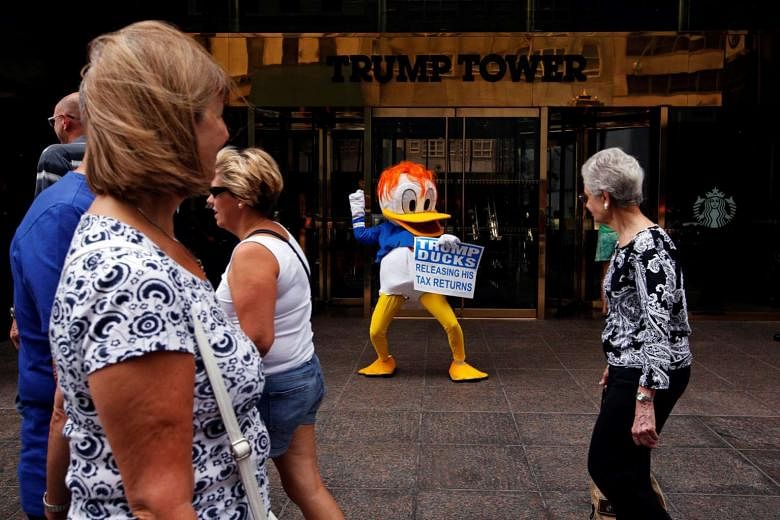As ethics counsel to United States President Barack Obama and his predecessor, we scrutinised their tax returns before they were released every year. We also worked with our colleagues to review many tax returns of presidential nominees for Cabinet and other positions.
Based on the few pages of Mr Donald Trump's 1995 tax returns that have become public, we have come to the conclusion that no one in his position would have been nominated, much less confirmed by the Senate, during either of the administrations that we served. The same is true of any modern administration of a president from either party.
If a presidential candidate cannot meet that standard, then we question his qualifications for the highest office in the land.
In both the George W. Bush and Obama administrations, a bad attitude about paying taxes was a deal killer. Both of us saw instances of nominations that were doomed by the arguably legal but unsavoury use of tax loopholes, as well as by the failure to pay Social Security taxes, the taking of excessive deductions for home offices or the sidestepping of sales taxes on out-of-state purchases. Explaining to the Senate and to the American people how a billionaire could have a US$916 million "loss carry-forward" that potentially allowed him to not pay taxes for over a decade, perhaps for as long as 18 years, would have been far too difficult for the White House when many hard-working Americans turn a third or more of their earnings over to the government.
Any nominee who had told either of us that he had a "fiduciary responsibility" as a businessman or to his family to pay as little tax as possible, as Mr Trump put it, would have been told to stop wasting the president's time.
 An activist with a sign referring to US presidential candidate Donald Trump and his tax returns outside Trump Tower in New York City last month. Based on the few pages of Mr Trump's 1995 tax returns that have become public, the writers have concluded that no one in his position would have been nominated for Cabinet and other positions during either of the administrations that they served. PHOTO: REUTERS
An activist with a sign referring to US presidential candidate Donald Trump and his tax returns outside Trump Tower in New York City last month. Based on the few pages of Mr Trump's 1995 tax returns that have become public, the writers have concluded that no one in his position would have been nominated for Cabinet and other positions during either of the administrations that they served. PHOTO: REUTERS
People who believe they have a legal duty to put self-interest before the public interest do not belong in public service. Besides, these are personal tax returns we are talking about. There is no such thing as a "fiduciary duty" as a businessman to oneself. That, as we have said before, is called greed.
There is also no fiduciary duty to one's family to minimise taxes by taking advantage of loopholes. Quite to the contrary, many of us want to set an example that teaches our children the responsibilities as well as the enormous benefits of being an American.
Even in large public companies, the argument that there is a fiduciary duty to shareholders to structure deals to minimise taxes is false. The law does not require corporate officers and directors to avoid taxes, much less to aggressively take advantage of strategies to eliminate them for years to come.
Some corporate directors and chief executives make this bogus fiduciary-duty argument to justify selfish decisions to use loopholes, such as the infamous "tax inversion" tactic of moving a corporate headquarters to Ireland or some other tax haven, sending revenue and jobs out of the US. We now know that when Mr Trump complains about such legal but unpatriotic tax-avoidance tactics, he is in effect complaining about himself.
The final deal killer here is Mr Trump's objection to the release of even the limited information that has come out, as well as his refusal to disclose more. At the White House, we asked nominees for Senate-confirmed positions to sign a waiver so that we could get tax information from the Internal Revenue Service, and we also asked nominees to be ready to provide their tax returns to the Senate upon request.
Several of the committees most important to national security and the economy - such as the Armed Services Committee and the Committee on Finance - routinely insist on receiving tax returns. Neither of us can recall a single nominee who refused, and with good reason. If the White House were to so much as delay disclosing the tax returns of a nominee, much less tell the Senate that a nominee did not want to disclose them, the nomination would be dead on arrival.
Scrutiny of nominees' returns is exacting. Mr Bush's first treasury secretary, Mr Paul O'Neill, made headlines when the Senate's review of his returns resulted in his amending them to correct errors for three years and pay a nominal sum in back taxes. Current Treasury Secretary Jacob Lew was required to provide a full six years of returns before he was confirmed.
No presidential nominee with Mr Trump's tax situation, his years of undisclosed tax returns and his attitude towards paying taxes could have been approved by the Senate.
Indeed, no president would have dared nominate him. All of us should weigh that heavily in assessing Mr Trump's fitness for the Oval Office.
NYTIMES
- Norman Eisen, a visiting fellow at the Brookings Institution, was the chief White House ethics lawyer from 2009 to 2011 and US ambassador to the Czech Republic from 2011 to 2014. Richard W. Painter, a professor at the University of Minnesota Law School, was the chief White House ethics lawyer from 2005 to 2007.

